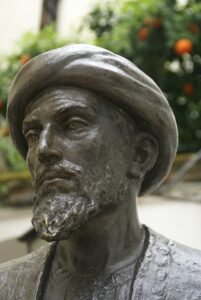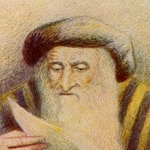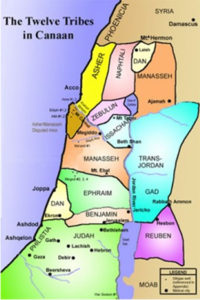Maimonides & Jesus of Nazareth – the Messiah?

Messiah or stumbling block? Rabbi Maimonides expressed his views on this question about Jesus of Nazareth as well as thoughts on Messiah prophecies, his lineage, and supernatural powers.
Author of Mishneh Torah, Maimonides’ book is considered to be a monumental Jewish work. He is responsible for formulating the 13 principals of Jewish faith.[1]
Born during the Medieval era in 1135 AD, Moses Ben Maimon came to be known by a single name: Maimonides. In Jewish circles, Maimonides is better known as Rambam, the Rabbi who brought clarity to Jewish Law with some calling him “the second Moses.”
Two chapters of Mishneh Torah focused on the Messiah. Chapters 11 and 12 contains characteristics that would identify the Mashiach, Hebrew for Messiah, or would disqualify anyone purporting to be the Messiah.[2]
Considered controversial, his statements became a target of the Censor. As late as the 1990s, portions of Chapter 11 were relegated only to footnotes and even today requires deeper digging under the names Melachim uMilchamot or Mishneh Torah, Kings and Wars.
Explicitly in Chapter 11, Maimonides identified Balaam’s (Bilaam) prophecy as messianic. In a phrase-by-phrase interpretations, in agreement with Rabbi Rashi, he interpreted Balaam’s prophecy as referring to Mashiach:
“Reference to Mashiach is also made in the portion of Bilaam who prophesies about two anointed kings: the first anointed king, David, who saved Israel from her oppressors; and the final anointed king who will arise from his descendants and save Israel in the end of days. That passage Numbers 24:17-18 relates:
‘I see it, but not now’ – This refers to David;
‘I perceive it, but not in the near future;” – This refers to the Messianic king;
‘A star shall go forth from Jacob’ – This refers to David;
‘and a staff shall arise in Israel’ – This refers to the Messianic king…“
Multiple prophecies establish a prophetic requirement the Messiah must be born in the royal lineage of David. Maimonides agreed:
“In the future, the Messianic king will arise and renew the Davidic dynasty, restoring it to its initial sovereignty.
Describing characteristics that would identify the Messiah when he arrived, the Rabbi expounded:
“If a king will arise from the House of David who diligently contemplates the Torah and observes its mitzvot as prescribed by the Written Law and the Oral Law as David, his ancestor, will compel all of Israel to walk in (the way of the Torah) and rectify the breaches in its observance, and fight the wars of God, we may, with assurance, consider him Mashiach.”
Anyone who denies the Messiah, Maimonides wrote, is denying the prophets, Moses, and the Scriptures. It is the same three prophetic aspects pointed out about himself to his followers and Cleopas by the resurrected Jesus: [3]
“Anyone who does not believe in him or does not await his coming, denies not only the statements of the other prophets, but those of the Torah and Moses…
Next, Maimonides described more pointedly the things that would disqualify anyone who might otherwise be viewed as the Messiah. Denouncing Jesus, the Rabbi pointedly called out Jesus of Nazareth by name saying he only “aspired” to be the Messiah, was executed, and that Christianity was a “stumbling block.”[4]
“If he did not succeed to this degree or was killed, he surely is not the redeemer promised by the Torah. Rather, he should be considered as all the other proper and complete kings of the Davidic dynasty who died. God caused him to arise only to test the many, as Daniel 11:35 states: ‘And some of the wise men will stumble, to try them, to refine, and to clarify until the appointed time, because the set time is in the future.'”
“Jesus of Nazareth who aspired to be the Mashiach and was executed by the court was also alluded to in Daniel’s prophecies, as ibid. 11:14 states: ‘The vulgar among your people shall exalt themselves in an attempt to fulfill the vision, but they shall stumble.'”
“Can there be a greater stumbling block than Christianity?”
Mishneh Torah launched Maimonides into Jewish celebrity status prompting letters sent to him with questions. His response letters, known as Responsa (or Teshuvot), have become additional important texts of Maimonides’ Scriptural interpretations.[5]
One Responsa was to Yeminite Rabbi Jacob al-Fayumi, known as the “Epistle Concerning Yemen.” In the letter, Maimonides regarded Zachariah 6:12 and the parashah of Isaiah 52:13-53:12 as messianic prophecies. He quoted from Isaiah 52:15 and 53:2 foretelling the Messiah could be identified by his origins and his wonders:[6]
“…all the kings of the earth be thrown in terror at the fame of him – their kingdoms be in consternation, and they themselves will be devising whether to oppose him with arms, or to adopt some different course, confessing, in fact their inability to contend with him or ignore his presence and so confounded at the wonders which they will see him work, that they will lay their hands to their mouth; in the words of Isaiah, when describing the manner in which the kings will hearken to him, At him kings will shut their mouth; for that which had not been told them have they seen, and that which they had not heard they have perceived. [Is. 52:15] ”
“What is to be the manner of Messiah’s advent, and where will be the place of his first appearance?
…there shall rise up one of whom none have known before, and the signs and wonders which they shall see performed by him will be the proofs of his true origin; for the Almighty where he declares to us his mind upon this matter, says, ‘Behold a man whose name is the Branch, and he shall branch forth out of his place’ (Zech. Vi. I2). And Isaiah speaks similarly of the time when he will appear, without his father or mother or family being known, He came up before him, and as a root out of the dry earth [Is 53:2], etc.”
Supernatural powers of performing miracles, wonders, and resurrection of the dead were addressed by Maimonides in Chapter 11 without mentioning the Gospels nor Jesus of Nazareth by name. What the Rabbi did not say is often overlooked – such miracles could be performed by the Messiah although he did not say it is a requirement.
“One should not presume that the Messianic king must work miracles and wonders, bring about new phenomena in the world, resurrect the dead, or perform other similar deeds. This is definitely not true.”
Was Jesus of Nazareth a fulfillment of the Messiah prophecies or merely a stumbling block, a test sent by God?
Updated April 20, 2025.
This work is licensed under a Creative Commons Attribution-NonCommercial-NoDerivatives 4.0 International License.
REFERENCES:
[1] Maimonides. Mishneh Torah. Jewish year 4937 (1177 AD). “The Rambam’s Mishneh Torah.” <http://www.chabad.org/library/article_cdo/aid/682956/jewish/Mishneh-Torah.htm> Rich, Tracey R. “Jewish Beliefs.” JewFAQ.org. n.d. <http://www.jewfaq.org/beliefs.htm> “Moses Ben Maimon.” Jewish Encyclopedia. 2011. <http://www.jewishencyclopedia.com/articles/11124-moses-ben-maimon> Furst, Rachel. “The Mishneh Torah.” MyJewishLearning.com. 2010. <http://mobile.myjewishlearning.com/texts/Rabbinics/Halakhah/Medieval/Mishneh_Torah.shtml> Seeskin, Kenneth. “Maimonides.” Stanford Encyclopedia of Philosophy. 2006. revised 2017. <https://plato.stanford.edu/entries/maimonides> Maimonides statue. Wikimedia Commons. image. n.d. <https://commons.wikimedia.org/wiki/File:Maimonides_statue_-_Cordoba.jpg>
[2]] Maimonides, Moses. Mishneh Torah. Ed. Yechezkal Shimon Gutfreund, Brooklyn, NY: Sichos in English. “The Law Concerning Moshiach.” Kesser.org. n.d. <http://www.kesser.org/moshiach/rambam.html#SIE> Maimonides. Mishneh Torah. “uMilchamot, the Laws of Kings and Their War.” 2015. <https://www.chabad.org/library/article_cdo/aid/1188343/jewish/Melachim-uMilchamot.htm> Maimonides. Mishneh Torah. Sefaria.org. 2023. “Mishneh Torah, Kings and Wars.” <https://www.sefaria.org/Mishneh_Torah,_Kings_and_Wars?tab=contents>
[3] Maimondies, Mishnah Torah. Melachim uMilchamot. CR Josephus, Flavius. Against Apion. Book 1 #6-7. The Complete Works of Josephus. <http://books.google.com/books?id=e0dAAAAAMAAJ&printsec=frontcover&source=gbs_ge_summary_r&cad=0#v=onepage&q&f=false> Luke 24:24-27, 44.
[4] Mangel, Nissen. “Responsa.” Publisher: Kehot Publication Society. 2008. Chabad.org. 2014. <http://www.chabad.org/library/article_cdo/aid/107783/jewish/Responsa.htm> “Jesus of Nazareth.” Jewish Encyclopedia. 2011. <https://jewishencyclopedia.com/articles/8616-jesus-of-nazareth>
[5] Mangel.“Responsa.”
[6] Maimonides. “Letter to the South (Yemen)”. p374. Neubauer and Driver. The Fifty-third Chapter of Isaiah According to the Jewish Interpreters <https://books.google.com/books?id=YxdbAAAAQAAJ&pg=PP1&hl=en#v=onepage&q=advent&f=false> CR “Iggerot HaRambam, Iggeret Teiman.” Sefaria.org. responsa. n.d. <https://www.sefaria.org/Iggerot_HaRambam?tab=versions> “Responsa.” Chabad.org. “The Epistle Concerning Yemen.”n.d.<https://www.chabad.org/library/article_cdo/aid/107783/jewish/Responsa.htm>


 Israel conquered its enemies in the land and each of the 12 tribes of the sons of Israel were allotted their own regions.
Israel conquered its enemies in the land and each of the 12 tribes of the sons of Israel were allotted their own regions.